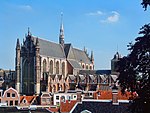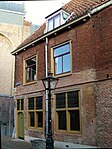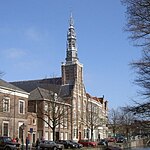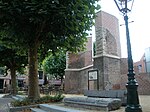Vrijplaats Koppenhinksteeg
1968 establishments in the Netherlands2010 disestablishments in the NetherlandsBuildings and structures in LeidenEvicted squatsInfoshops ... and 3 more
Rijksmonuments in LeidenSocial centres in the NetherlandsSquats in the Netherlands

Vrijplaats Koppenhinksteeg (Freespace on Koppenhinksteeg street) was a complex of buildings first squatted in 1968 in Leiden, the Netherlands. It took its name from the alley on which it was located and was run since the 1990s by the Vrijplaats Koppenhinksteeg Foundation. Various groups including Eurodusnie used the different spaces as a bar, café, a freeshop, a foundation to support undocumented migrants, an information centre, a library and a sports club. In 2010, the entire complex was evicted. From 2012 onwards a new space called the Vrijplaats Leiden (Freespace Leiden) was set up elsewhere.
Excerpt from the Wikipedia article Vrijplaats Koppenhinksteeg (License: CC BY-SA 3.0, Authors, Images).Vrijplaats Koppenhinksteeg
Waardgracht, Leiden
Geographical coordinates (GPS) Address Nearby Places Show on map
Geographical coordinates (GPS)
| Latitude | Longitude |
|---|---|
| N 52.158653 ° | E 4.497347 ° |
Address
Vestingwerken van Leiden
Waardgracht
2312 MV Leiden
South Holland, Netherlands
Open on Google Maps










